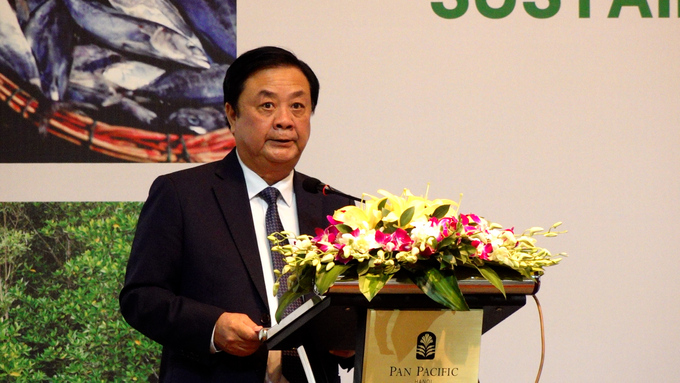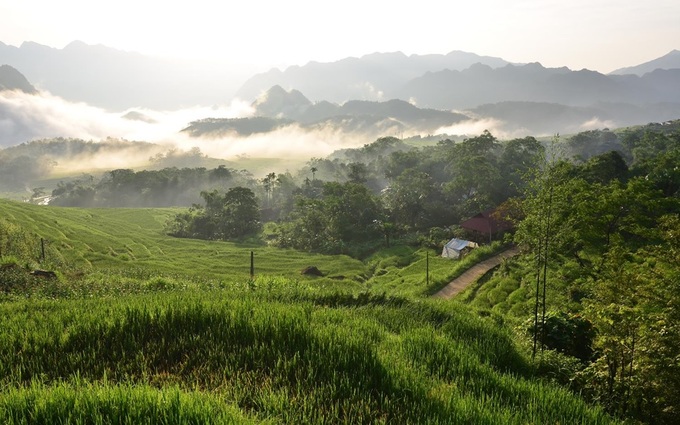May 16, 2025 | 10:29 GMT +7
May 16, 2025 | 10:29 GMT +7
Hotline: 0913.378.918
May 16, 2025 | 10:29 GMT +7
Hotline: 0913.378.918
On August 26, the Ministry of Agriculture and Rural Development (MARD) in collaboration with the United Nations Development Program (UNDP) in Vietnam held a High-Level Policy Dialogue on “Sustainable Co-management of Nature Resources in the context of Climate Change”. The dialogue was co-chaired by Minister of Agriculture and Rural Development Le Minh Hoan and UNDP Resident Representative in Vietnam Caitlin Wiesen.
Speaking at the event, Minister Le Minh Hoan said, “Natural resources are still on a downward trend, while communities who depend on natural resources in the locality for their livelihoods have restricted access to these resources. Therefore, it is necessary to consider other organization and implementation solutions such as 'collaborative management/co-management' or 'community management' to emphasize the important role of communities in monitoring, managing and sharing natural resource values.”

Minister Le Minh Hoan at the High-Level Policy Dialogue on “Sustainable Co-management of Nature Resources in the context of Climate Change”. Photo: Linh Linh.
At the beginning of the presentation session at the workshop, National Coordinator of World Agroforestry (ICRAF) Nguyen Quang Tan shared an overview of the concepts of "co-management", "collaborative management" and experience from countries around the world.
“Co-management is a situation in which two or more social actors negotiate, determine and assure each other an equitable share of management functions, rights and responsibilities for a specific zone, an area or a certain set of natural resources.” It is an adaptive and governance-shared approach based on the view that natural resource management is a process of learning and improvement through experience.
Co-management can be operated with many forms of natural resources. Some typical examples include Forest and forest land: Andhra Pradesh (India) and Palawan island (Philippines); National Park: Vatnajökull (Iceland); Agricultural production: boneh system (Iran); Irrigation and water management: Lake Encadenadas Basin (Argentina); Grazing land: Loess Plateau (China); Marine resources: Sian Ka'an Biosphere Reserve (Mexico); Fisheries: Mekong River (Laos).
Going deeper into the concept of co-management are several related forms. For example, “collaborative management” is the cooperation between government agencies, local communities and stakeholders in the management of a certain area or type of natural resource. “Adaptive collaborative management” is similar to collaborative management but it emphasizes the collaborative value-adding learning process. “Social forestry/community forestry” takes the community as the main actor in forest resource management. “Joint forest management” means cooperation between the state forestry agency and local communities in managing forests under state management. And “household forestry” is a form of forest resource management conducted by households.
During the Dialogue, delegates listened and had discussions surrounding a number of models effectively implemented by stakeholders in collaboration with the MARD and localities. National and international experts as well as people of localities directly participated in the presentation and proposed adjustments in policy to promote and further replicate co-management models throughout Vietnam.
Abraham Guillen, Director of the Sustainable Forest Management Component - Sustainable Forest Management and Biodiversity Conservation project, shared about "Community-Based Forest Management (CBFM)" - part of the Forest Management and Biodiversity Conservation in Vietnam (VFBC) project funded by USAID. The model is deployed in 7 provinces including Lao Cai, Son La, Hoa Binh, Thanh Hoa, Nghe An, Quang Tri and Quang Nam.
CBFM model has deployed various forms of co-management. Communities in the project are contracted to protect the forest, receive cooperation in forest management assigned to households, and manage the allocated forest areas.

The total forested area of CBFM model reaches 3,837,754 ha, of which natural forest accounts for 2,783,211 ha. Photo: VFBC.
As stated by Abraham Guillen, CBFM is an effective and low-cost way to achieve the goals of climate change response and sustainable development while enhancing land tenure rights for forest-based communities and reducing the loss of forest land and forest degradation. ‘With its potential to provide a foundation for sustainable, multi-functional landscape design and management, CBFM plays a remarkable role in the government’s strategies and national programs on forestry development, socio-economic development of ethnic minority and mountainous regions.”
Regarding the fishery industry, Huynh Quang Huy, Chairman of Binh Thuan Fisheries Association, shared his practical experiences in supporting and accompanying fishing communities to develop livelihoods through co-management in protecting aquatic resources in Binh Thuan.
Binh Thuan has formed and operated three fishing communities to adopt fisheries co-management in three communes of Thuan Quy, Tan Thanh, and Tan Thuan under the fisheries association model.
The co-management model shows many positive effects: Promoting the implementation of the 2017 Fisheries Law into action; Promoting the issuance of co-management policies and mechanisms; Encouraging other provincial governments and fishing communities to adopt the initiative of co-management; Enhancing livelihoods for fishermen and creating opportunities for new service industries and community-based tourism based on the conserved ecosystems and aquatic resources.
Translated by Samuel Pham

(VAN) Cold-barn systems efficiently manage environmental and temperature conditions, which aids in the prevention of respiratory diseases in pigs and protects them from the vectors that transmit African swine fevers.

(VAN) To tackle challenges, the project 'Addressing key technical bottlenecks in the grouper supply chain in Vietnam' has been underway since 2024.

(VAN) The project 'Disease-Resilient and Sustainable Cassava Production Systems in the Mekong Region', funded by the Australian Center for International Agricultural Research (ACIAR), is being implemented from 2024 to 2028.

(VAN) Data from 10,000 farming households will help professionalize production organization and support the implementation of the One Million Hectares Program for High-Quality, Low-Emission Rice Cultivation.

(VAN) FAO Director-General QU Dongyu marks International Day of Plant Health at NENA conference.

(VAN) Deputy Minister of Agriculture and Environment Hoang Trung affirmed that floriculture and ornamental plants are a growing industry that receives significant global attention.

(VAN) The three staple crops dominating modern diets – corn, rice and wheat – are familiar to Americans. However, fourth place is held by a dark horse: cassava.